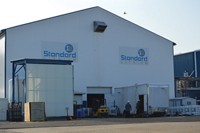Advertisement
Grab your lab coat. Let's get started
Welcome!
Welcome!
Create an account below to get 6 C&EN articles per month, receive newsletters and more - all free.
It seems this is your first time logging in online. Please enter the following information to continue.
As an ACS member you automatically get access to this site. All we need is few more details to create your reading experience.
Not you? Sign in with a different account.
Not you? Sign in with a different account.
ERROR 1
ERROR 1
ERROR 2
ERROR 2
ERROR 2
ERROR 2
ERROR 2
Password and Confirm password must match.
If you have an ACS member number, please enter it here so we can link this account to your membership. (optional)
ERROR 2
ACS values your privacy. By submitting your information, you are gaining access to C&EN and subscribing to our weekly newsletter. We use the information you provide to make your reading experience better, and we will never sell your data to third party members.
Energy Storage
Lithium producers show interest in the US
Companies are betting on high prices and auto industry desire for local supplies
by Matt Blois
December 3, 2021

Strong demand for lithium, used to make batteries for electric vehicles, is increasing interest in extracting the mineral within the US.
The lithium price index of the consulting firm Benchmark Minerals is up about 240% since the beginning of the year. In November, the Chilean lithium chemical maker SQM reported that profits from its lithium business more than doubled during the first 9 months of 2021 compared to the same period in 2020. The company expects lithium prices to be even higher in the fourth quarter.
“These results were driven by considerably higher sales volumes and prices,” SQM CEO Ricardo Ramos said on a conference call. “Demand in lithium markets is exceeding our previous expectations.”
The US gets most of its lithium from South America, where it is produced cheaply by pumping lithium-rich brines into large ponds and letting them evaporate.
Some US auto manufacturers want a domestic source to protect their battery supply chains. In July, GM invested in the Controlled Thermal Resources’ lithium project in California’s Salton Sea, and Tesla owns lithium clay deposits in Nevada. Such concerns, paired with high prices, are spurring other lithium development projects in the US.
Currently, Albemarle is the only company producing basic lithium chemicals in the US. The specialty chemical maker plans to double extraction capacity at its site in Silver Peak, Nevada, by 2025.
In December, Standard Lithium raised $100 million from Koch Strategic Platforms to continue working on a direct-lithium-extraction project in southwest Arkansas. Rather than using evaporation ponds, direct lithium extraction chemically removes lithium from brines and pumps the leftover water back to the aquifer.
The investment follows Anson Resources’ decision last month to conduct a feasibility study for a lithium plant in Utah. The company says the move was motivated by the increase in lithium prices and better lithium-production technology.
And in November, EnergySource Minerals received approval from a local planning commission to extract lithium from brine at a geothermal plant in the Salton Sea. The company expects to start construction on its facility in 2022 and begin operations in 2024.
Edward Anderson, CEO of TRU Group, a firm that provides consulting services for lithium projects, says he’s not optimistic about the prospects for direct lithium extraction, which he calls an unproven technology.
“We don’t have a direct extraction technology that, to my mind, is anywhere near commercialization,” he says.
If companies working in the US can increase lithium production, Benchmark Minerals analyst Cameron Perks says, there’s a chance they’ll be able to compete with operations in other countries. He says electric vehicle manufacturers aiming to reduce their carbon footprint may view US lithium as more environmentally friendly.
“Beggars can’t be choosers in the short term,” Perks says. “Over the next few years, they’re going to have to just find [lithium] wherever they can. But long term, maybe they’ll be able to choose a bit more, in terms of environmental connotations.”




Join the conversation
Contact the reporter
Submit a Letter to the Editor for publication
Engage with us on Twitter